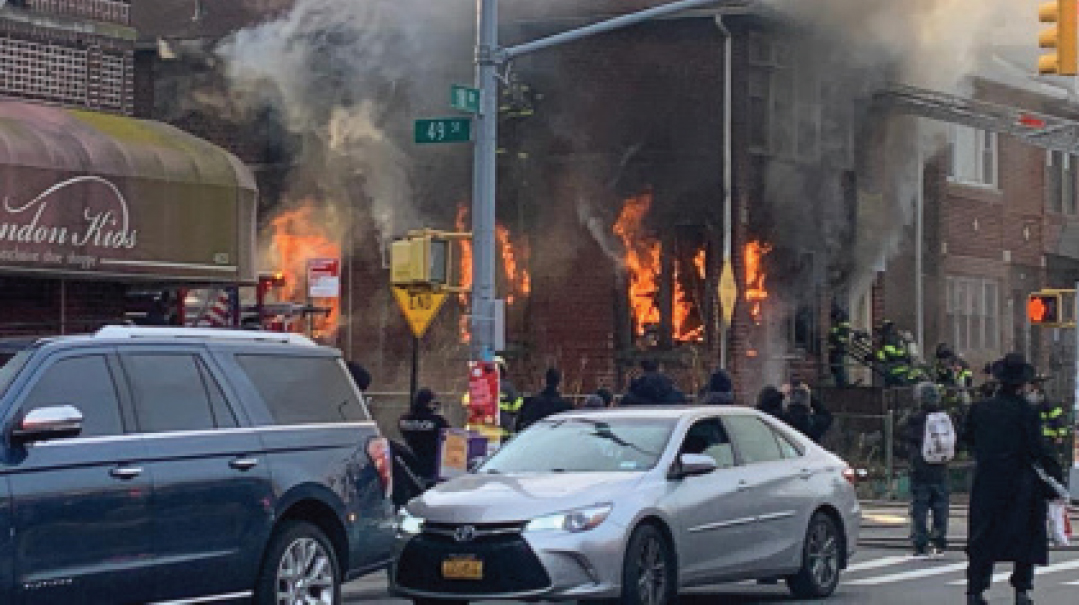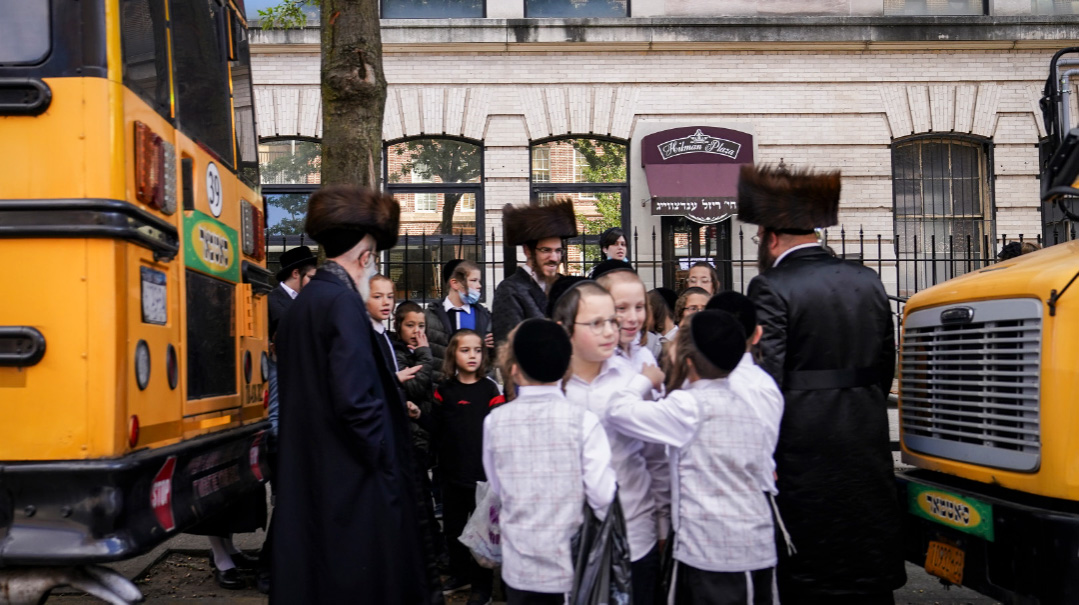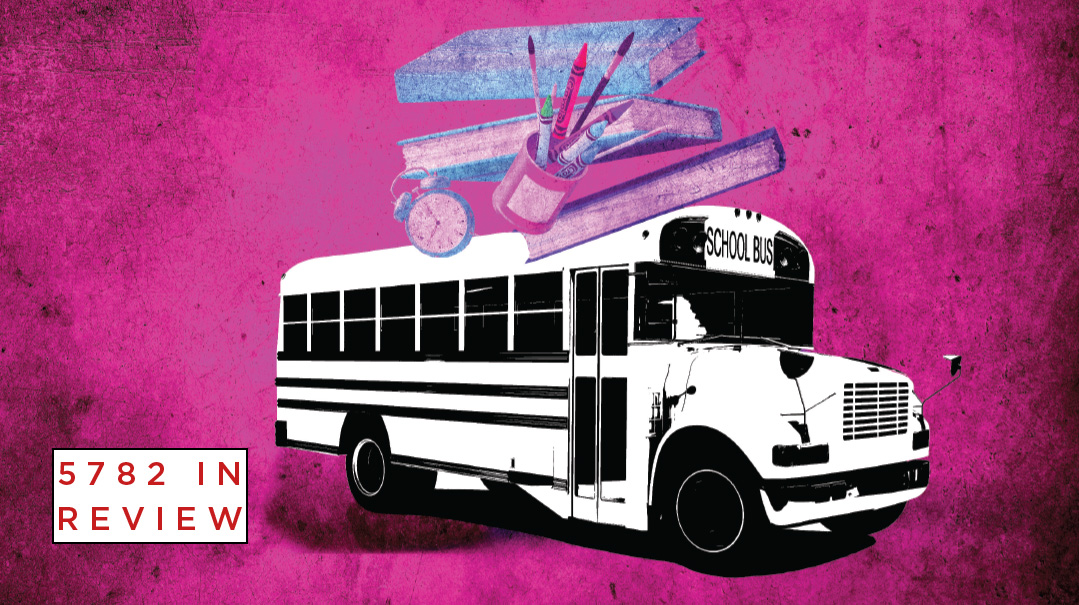Landmark Shul Up in Flames

Felder’s burnt shul, a place I called home

The flames that ripped through the landmark Congregation Beth Aaron last Thursday, totally destroying the Boro Park minyan factory and its upstairs apartments, elicited a melancholy wave of nostalgia for those who have known the shul as “Felder’s” since its founding seven decades ago.
“When your father was niftar,” one man told State Senator Simcha Felder, the son of shul founder Rav Tzvi Mordechai Felder ztz”l, “I felt that he was still here, because Rabbi Felder was the shul, and the shul was still standing. When I saw that fire, I felt that Rabbi Felder had just passed away.”
The shul on the corner of 18th Avenue and 49th Street stood as an island of stability amid the turbulence and technological advances whirling outside. Its heavy, ancient wooden benches and tables darkened with age had seated gedolim and businessmen alike. The shul was unique in that its founding led to the frum neighborhood being built around it, rather than the opposite.
For me and the extended Donn clan, the building held an entire basket of childhood memories. The apartment atop the shul was where my beloved grandparents lived for 50 years, where my father grew up. It was the setting for a thousand anecdotes that fill family lore — a trove of Purim seudos, Pesach Sedorim, Chanukah parties, and the obligatory pre-summer visits. For me, the walls and floors, always whitewashed and stone-clean, still contain the smells of my grandmother’s gefilte fish, her chocolate chip cookies doled out with European precision.
To my father, Rabbi Chaim Donn, and my Uncle Zorach, the shul was their playground. They and the Felders practically grew up within its confines, utilizing every nook and cranny for another game, every corner holding the secrets of youthful play. They grew up with Rav Yaakov Hoffman, an elder talmid of Rav Boruch Ber Leibowitz who was always ready to learn, to schmooze, to reminisce. They still associate the shul with Rav Yosef Elefant’s daf yomi shiur, enunciated in his deep baritone.
Rabbi Felder — who arrived in New York as an infant with his parents from their native Sanik, Poland — started the shul when he moved to the area in 1952. The location was unusual then; 18th Avenue was not even on the outer edges of Boro Park, which at the time spanned 13th to 16th Avenues. Rabbi Felder named the shul Beth Aaron in memory of his father.
To attract mispallelim in extraordinary times, Rabbi Felder resorted to extraordinary methods. He would stand outside, calling to drivers and pedestrians alike, “Excuse me, sir, are you Jewish? Can you come in for a minyan?” Simcha Felder even recalled him going to a takeout across the avenue to ask the owner to be mashlim.
“This part of town really developed because of my father’s mesirus nefesh,” recalled Felder, who, despite his position in Albany, remains the gabbai, pushke man, and the guy who cleans up after Shalosh Seudos. “People wanted to move here because there was cheaper housing, but they wanted to move to a place where they would have a place to learn and daven. The fact that my father would stand outside and collect people to make a minyan — the neighborhood developed because of that. Felder’s was the only game in town then.”
My own father recalled that Rabbi Felder “kept those minyanim rolling, one after the other.” In practices that were unheard of at that time, Rabbi Felder kept the air conditioner on throughout the day, and left the shul open until late at night. A side door leading to the basement was always unlocked to allow access to the restroom. Since it was near a city bus stop, drivers and mailmen would come in frequently.
“This was the first public shul that belonged to everybody,” my father said.
Great rabbanim graced the shul regularly, including the Ponevezher Rav, Rav Yosef Shlomo Kahaneman. Since his son lived a half block away, the Rav would daven in Felder’s during visits to the States. My father recalled the gabbai once asking Rav Kahaneman, a Kohein, to step out for Krias haTorah, since there were two chiyuvim who were Yisraelim. The gadol complied as if it were the most natural request in the world.
After davening, the Ponevezher Rav would be swamped by people asking about grandsons, nephews, or neighbors who learned in his yeshivah. “Him? Of course!” was his inevitable response.
The glue that attracted the eclectic crowd was Rabbi Felder, who was niftar at 95 ten years ago on Taanis Esther. He and his rebbetzin, the former Chaya Blond — who was safely extracted from the flames — played host to a wide range of activities, including a Talmud Torah in the 1950s for children he mined from the public school system, and the fledgling Yeshiva Derech Chaim when it began expanding. The yeshivah stayed there for ten years and Rabbi Felder never charged them a penny, despite the constant wear and tear.
“They have to pay the rebbeim,” Rebbetzin Felder would explain. “How would they pay for rent and electricity?”
“Everyone had a right to come in, everyone had an opinion, and Rabbi Felder would listen to everyone’s opinion,” my father said. “Whatever you wanted, you got. He didn’t show any personal ownership of the shul. And that’s why people felt so comfortable there.”
Rav Shmuel Felder, another son of Rav Felder and one of Lakewood’s main rabbanim, told me several years ago that a family neighbor related a story about Rav Refoel Hamburger that he didn’t believe until he met Rabbi Felder. A villager once accused Rav Hamburger, the 18th-century chief rabbi of Altona-Hamburg-Wandsbek, of robbing him. When the villager later saw the “robber” giving a drashah, he realized Rav Hamburger was actually a great person, and came over to beg forgiveness. Reb Refoel, however, thought the villager was still demanding restitution and exclaimed, “Please, I really didn’t take your things!”
Senator Felder said he had asked a gadol whether to rebuild and was awaiting a response. But whether or not the shul is rebuilt, a lot of memories went up in smoke.
“Felder’s won’t be Felder’s anymore,” one person tells me sadly.
(Originally featured in Mishpacha, Issue 841)
Oops! We could not locate your form.












